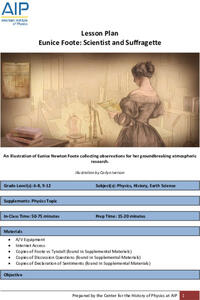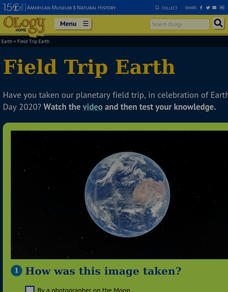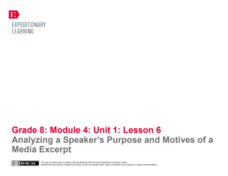Curated OER
Youth Emergency Preparedness
What is an emergency, why is preparing for one important, and how can your pupils help others prepare for an emergency? Answer these questions and more with a short unit. Learners will participate in a variety of collaborative,...
English Enhanced Scope and Sequence
Research Project Embedded with Media Literacy
Here is a phenomenal language arts lesson on media literacy for your middle and high schoolers. In it, learners produce a research product in the form of a public service announcement (PSA). First, they view examples of these PSA's to...
The New York Times
Stress Less: Understanding How Your Mind and Body Respond to Anxiety
What could be more relevant to teens and preteens than experiencing stress? Use an article from the New York Times website to practice valuable Common Core skills for informational text reading, and also get a discussion going in your...
Carolina K-12
World War II through the Radio Waves
Young historians channel the very medium used to convey news during World War I. They create and present a five-minute radio broadcast on a particular topic from the war, such as the roles of African Americans and women, war bonds,...
Beyond Benign
Great Expectations Through Modification
Explore the changes genetic modifications make just to make it in our world. Scholars track the production of insulin over time and discover how genetic modifications make the treatment of diabetes possible.
Beyond Benign
The Story of Cosmetics Video Assessment
Does your shampoo contain carcinogens? Scholars learn how cosmetic companies create and market their products, many of which contain toxic chemicals. They examine the bias and consumer responsibilities in the industry.
National Geographic
Types of Volcanic Eruptions
Blow the roof off your classroom with this multimedia science lesson on volcanic eruptions. A short online video teaches young geologists about shield and composite volcanoes and explores the examples of Kilauea and Mt. Vesuvius,...
American Institute of Physics
Eunice Foote: Scientist and Suffragette
The greenhouse effect and climate change are hot topics in today's news. Young scientists may be surprised to learn that the concept is not a new one. In fact, Eunice Newton Foote, scientist, inventor, and suffragette, discovered the...
American Institute of Physics
African Americans in Astronomy and Astrophysics
A two-part lesson focuses on the contributions to the fields of astronomy and astrophysics of two African Americans: Benjamin Banneker and Dr. George Carruthers. In part one, scholars learn about Benjamin Banneker by examining his...
PBS
Pearl Harbor and the Internment of Japanese Americans during World War II
Balancing national security and civil liberties can be tricky. To appreciate the tension between these two concepts, class members investigate the Japanese attack on the U.S. Naval Base at Pearl Harbor and President Franklin D....
Smithsonian Institution
Singing for Justice: Following the Musical Journey of “This Little Light of Mine”
Scholars go on a musical journey to discover the origin, importance, and evolution of the song, "This Little Light of Mine". Class members boost their voice talents and clap to the beat while learning the lyrics in both English and Zulu....
Nemours KidsHealth
Suicide Prevention: Grades 6-8
Suicide prevention—a heavy topic but an important one. Over two lessons, pupils gain knowledge about suicide, particularly in teens, and how to advocate for a friend who feels suicidal or depressed. After researching the topic, scholars...
Nemours KidsHealth
Stress: Grades 6-8
Two lessons take a close look at stress. In lesson one, scholars identify common stressors and examine stress management strategies. Lesson two challenges pupils to keep a stress log for four weeks to aid in their personal journey of...
Nemours KidsHealth
Depression: Grades 6-8
Over two lessons, scholars examine depression—what it is, signs of it, and ways to cope. Through discussion, reading articles, writing a resource, and completing worksheets, participants make their way through the learning process,...
Nemours KidsHealth
Cyberbulling: Grades 6-8
Cyberbullying is the focus of two lessons. First, scholars discuss what cyberbullying is, and examine a problem-solving approach to handling cyberbullying, then create brochures on the topic. Second, pupils discuss the effects...
Nemours KidsHealth
Bullying: Grades 6-8
Two lessons promote social awareness and build relationship skills. In lesson one, scholars define bullying and role-play coping strategies. Lesson two challenges learners to diffuse a bullying situation using their knowledge of...
J. Paul Getty Trust
Exhibiting Common Threads
Artists working in different media often explore the same themes—to model how these same themes weave their way through different forms of artistic expression, scholars analyze images by Dorothea Lange, identifying key themes in her...
Nemours KidsHealth
Safe and Healthy Summer: Grades 6-8
The pull to sloth can be strong in the summer. The couch and the beach beckon, but the lazy days also provide the opportunity to practice healthy habits. Two activities urge tweens to try something new. First, they research healthy items...
Benjamin Franklin Tercentenary
Let’s Throw an Electric Science Party!
Are you looking for a shockingly good activity? Check out one that has middle schoolers recreate four of Benjamin Franklin's experiments. Groups investigate, observe, and draw conclusions about static electricity and electrical current....
American Museum of Natural History
Field Trip Earth
Take a field trip around Earth by way of satellite images. Learners watch a video lesson that describes different images taken from orbiting satellites. They then test their visual skills in a 14-question online quiz.
EngageNY
Analyzing a Speaker’s Purpose and Motives of a Media Excerpt
Middle schoolers listen to a media clip of a teacher-selected speech and analyze it for speaker's purpose using a Speaker’s Purpose graphic organizer. Pupils pair up to discuss their completed organizers and add any new information they...
EngageNY
Assessment Part 3: Advocating Persuasively in a Fishbowl
Class members complete the final part of the The Omnivore’s Dilemma end-of-unit assessment. The portion includes a fishbowl activity where learners demonstrate their persuasive advocacy abilities. As each pupil speaks, their peers assess...
EngageNY
Advocating Persuasively in a Fishbowl: Practice
What makes a good advocate? An informative lesson plan teaches class members how to advocate persuasively. They participate in a fishbowl activity and listen to the teacher model advocating persuasively. They then practice independently,...
EngageNY
Making a Claim and Advocating Persuasively: Preparing for the Practice Fishbowl
Scholars consider their reading in The Omnivore's Dilemma to develop a claim answering the question, "Which food chain would you choose to feed your family—the local sustainable food chain or the hunter-gatherer food chain?" To guide...

























